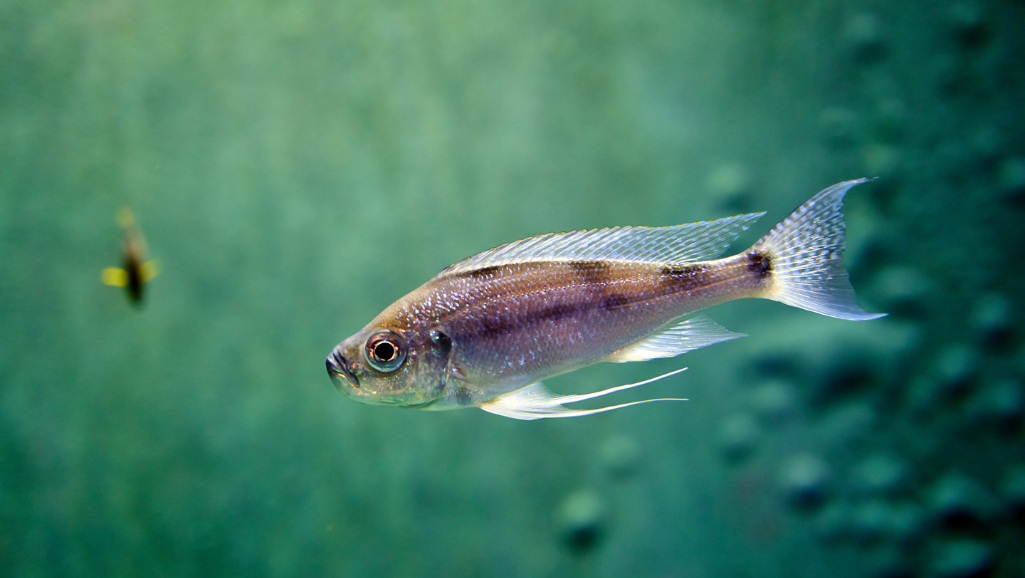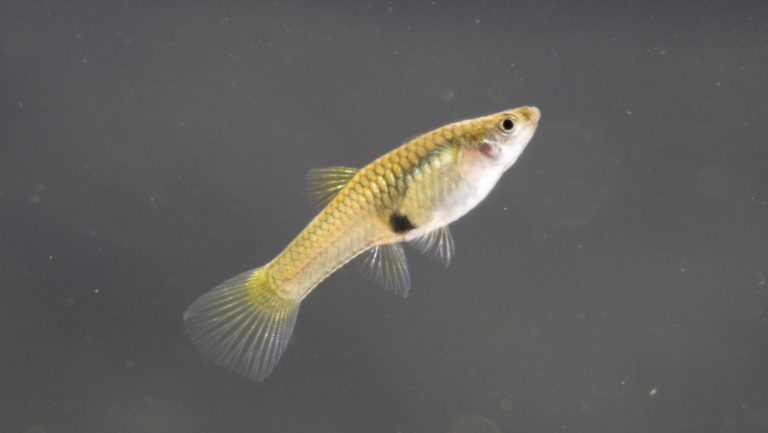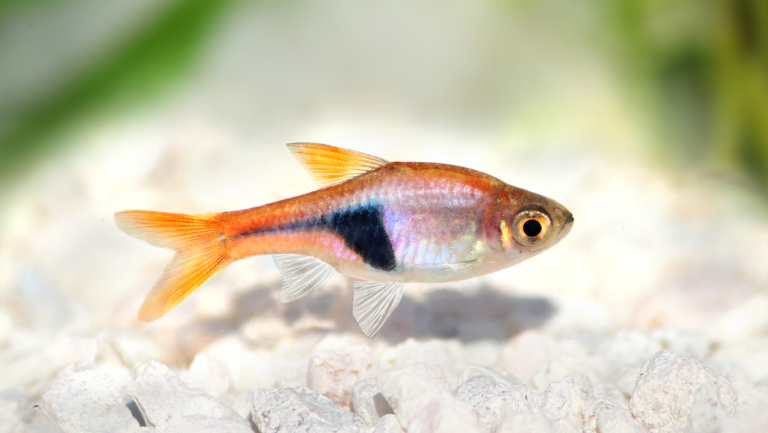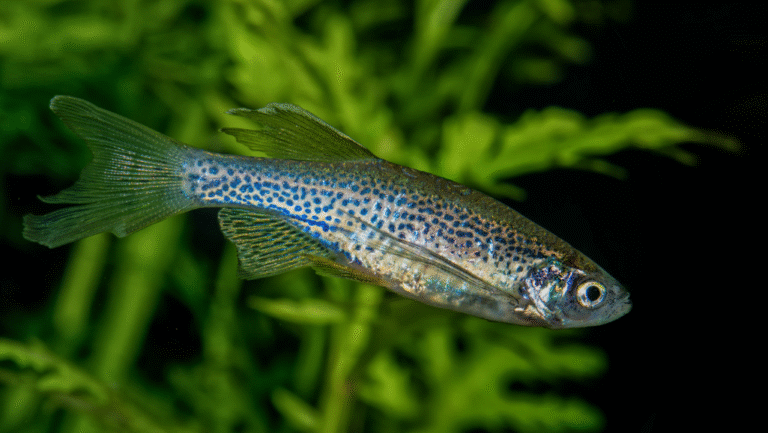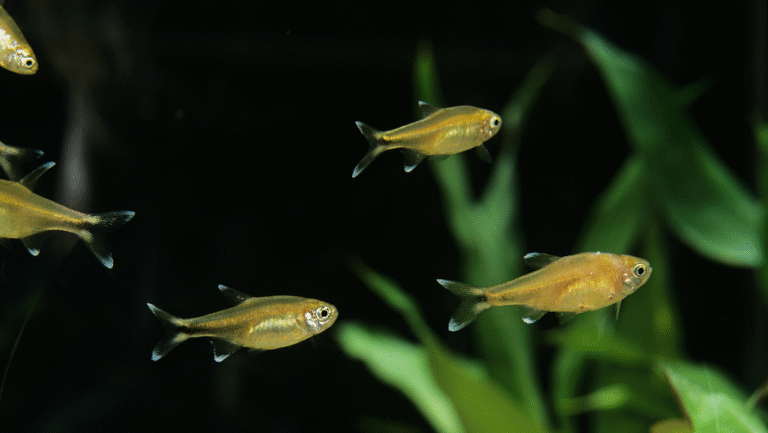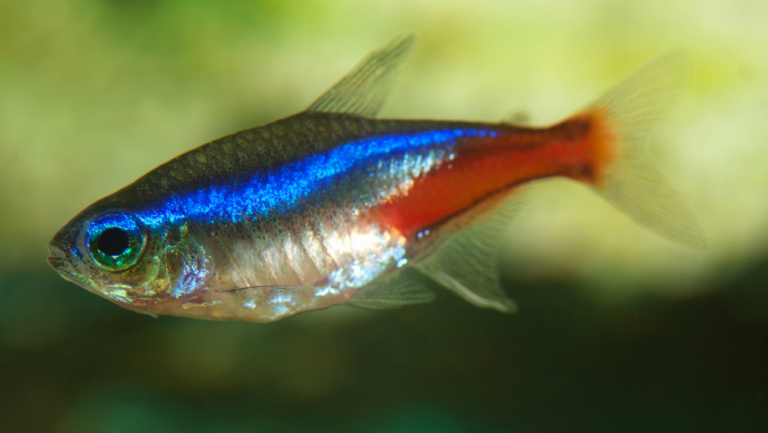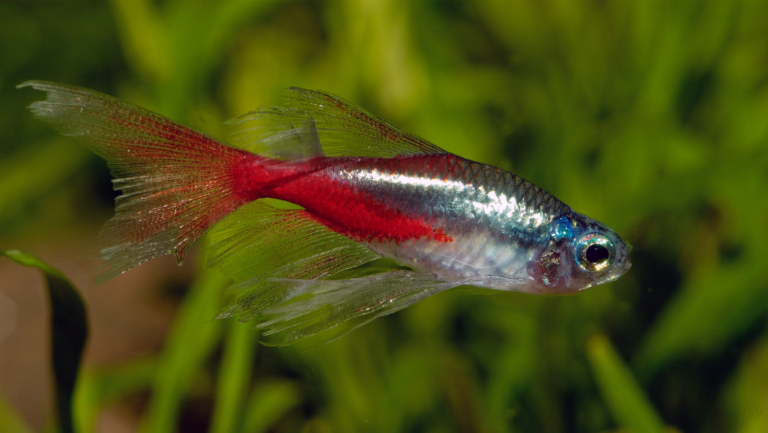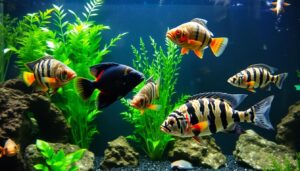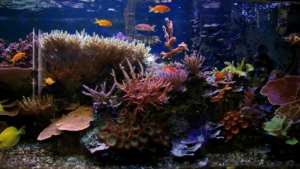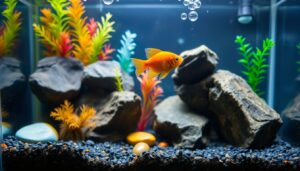Starting your journey in aquarium keeping brings you face-to-face with the Diamond Tetra’s beauty. This guide will show you why the Diamond Tetra is a treasure in the aquarium world.
Key Takeaways
- Diamond Tetras add sparkle and life to your aquarium.
- They need a tank of at least 15 gallons for enough room to swim.
- Feeding them right and keeping the water stable is important for their health and color.
- They do best with calm fish friends who like their peaceful vibe.
- With a life span of 3 to 6 years, they’re a rewarding choice for all aquarists.
- Creating a home that mimics their Amazonian habitat helps them thrive.
Introduction to Diamond Tetra
The Diamond Tetra fish is loved for its stunning looks and friendly nature. It’s a favorite among fish lovers. These small, colorful fish are key to a peaceful aquarium, working well with other calm fish.
Overview of Diamond Tetra
Diamond Tetras live for 3-5 years and need a clean tank to thrive. They grow up to 2.5 inches and do best in groups. A tank of at least 20 gallons is needed for a small school.
They eat twice to three times a day, which keeps them healthy and colorful. For more care tips, check out this aquariology site.
Natural Habitat
The natural habitat of Diamond Tetras is fascinating. They come from South America, near Lake Valencia. They like slow, slightly acidic to neutral water (pH 6.0-7.5).
In their natural home, they live among dense plants and leaf litter. This setup helps them stay healthy and behave naturally in captivity.
Importance in Aquariums
Diamond Tetras are great for community tanks. They look beautiful with their shiny scales and add to the tank’s balance. They’re perfect for both new and experienced fishkeepers.
To care for them, change 20-25% of the water weekly. Keep the water temperature between 72°F and 82°F. This helps them feel at home and stay healthy.
These Tetras are more than pets. They show us the beauty and complexity of aquatic life. They remind us of the need for conservation and responsible pet care.
Physical Characteristics
The Diamond Tetra, known as Moenkhausia pittieri, has unique and beautiful features. These traits make it a favorite among aquarium lovers. Knowing about its size, color, and special features helps us see why it’s a treasure in freshwater tanks.
Size and Appearance
Diamond Tetras grow to be 2 to 2.4 inches long. They fit well in community tanks. Their bodies are flat and long, making them look sleek and streamlined.
They can live for 3 to 6 years or more. This means they can be great friends for a long time.
Coloration
Their silver scales shimmer and shine. They seem to change colors depending on the light. You might see blues, greens, oranges, and golds.
Their fins are clear and sometimes have a hint of violet. This adds to their beauty.
Distinctive Features
The males have long, pointed dorsal fins. This is one of the main ways to tell males from females. Females have shorter fins.
There’s also a red mark on the upper half of their eyes. This is not just for looks. It also helps them stand out in their tank.
Behavior and Social Interactions
Understanding Diamond Tetras’ behavior and social interactions is key. It helps us know who they get along with, how active they are, and who makes good tank mates. This info is vital for a peaceful and healthy aquarium for these delicate fish.
Social Structure
Diamond Tetras are social fish that live in harmony. They do best in groups, which is natural for them. Keeping them in schools of five or more reduces stress and encourages natural behavior.
Watching them swim together can be calming for fish keepers. Their synchronized swimming is a beautiful sight.
Compatibility with Other Fish
Diamond Tetras get along well with many fish. They are peaceful and make great tank mates for calm species. Good choices include Corydoras catfish, livebearers, danios, and rasboras.
But, they shouldn’t be with big or aggressive fish. This can cause stress and competition, which is bad, even at feeding time.
Activity Levels
Diamond Tetras are active during the day. They like to explore and find food in their tank. They need space to swim and hiding spots, like plants or decorations.
They also need darkness to rest, which is good for their health and life span. This follows their natural day-night cycle.
Ideal Tank Conditions
The health of Diamond Tetras depends a lot on a well-set Diamond Tetra tank setup. The right tank conditions are key for their health and beauty. They need a space that closely resembles their natural habitats.
Recommended Tank Size
Choosing the right tank size is important. A 20-gallon tank is the minimum needed for these active fish. A proper tank size helps prevent stress and health problems.
Water Parameters
Keeping the water just right is vital. Diamond Tetras prefer water between 75°F and 82°F. The pH level should be between 5.5 and 7.5, which is slightly acidic to neutral. This ensures they can thrive and live long, just like in their native South America, as explained on AquaJoyLife’s guide.
Substrate and Decor
The type of substrate and decor is key to creating a real Amazonian feel. Use fine river sand or soft sediment as the substrate. Decor like driftwood, dark caves, and plants not only hide spots but also control light. This helps their natural colors and behavior.
With the right substrate and decor, your Diamond Tetras will be healthy and colorful. This setup supports their physical and mental health. It gives them a safe and stimulating place to live.
Feeding and Nutrition
A balanced Diamond Tetra diet is key for their health and bright colors. Knowing their nutritional needs and feeding schedule is vital. It greatly affects their lifespan and energy.
Natural Diet
In their Amazonian home, Diamond Tetras eat a variety of foods. They enjoy insects, larvae, and small crustaceans. To replicate this in your tank, mix animal and plant foods for a balanced diet.
Recommended Foods
Here are some foods good for Diamond Tetras:
- Live or frozen foods like brine shrimp, daphnia, and bloodworms for protein and fats.
- High-quality flake foods or micro-pellets for tropical fish for a complete diet.
- Blanched veggies like spinach and zucchini for vitamins and minerals.
It’s important not to overfeed and to pick foods that fit their small mouths.
Feeding Schedule
Feeding them regularly is part of caring for Diamond Tetras. Feed small amounts they can eat in a few minutes, two to three times a day. This prevents overeating and keeps the tank clean by reducing waste.
Following these feeding tips will help keep Diamond Tetras healthy and colorful. They will be a joy in any aquarium.
Breeding Diamond Tetras
Breeding Diamond Tetras needs careful planning and a controlled environment. This guide will help you set up the best conditions, manage egg-laying, and care for the fry.
Breeding Conditions
Start by creating a separate breeding tank to protect the eggs from adult fish. The tank should have water that’s right for breeding: 79–84°F (26–29°C) temperature, pH 5.5 to 6.5, and 3 dGH hardness. These conditions help the eggs hatch better and increase their chances of survival.
Egg-laying Process
After setting up the breeding tank, put in a pair of mature Diamond Tetras. This helps them get along and reduces stress. The female will lay eggs in plants or spawning mops. Move these eggs to a safe place to avoid the adults eating them. The eggs will hatch in about 36 hours, starting the fry stage.
Caring for Fry
Keeping the fry alive is key. Keep their water the same as the breeding tank but change it up to 50% weekly. This keeps the water clean and prevents disease. Start feeding them tiny, high-quality food like infusoria, then move to brine shrimp as they grow. Watch them closely and make small changes to help them thrive.
Diamond Tetra breeding is more than just raising fish. It’s about understanding and mimicking their natural environment. With the right care, it’s a fulfilling part of the aquarium hobby.
Common Health Issues
Keeping your Diamond Tetras healthy is all about preventing disease and treating it fast. Knowing the common health problems, their symptoms, and how to treat them is key. This way, you can create a great home for these fish.
Signs of Illness
Watching your Diamond Tetras for signs of illness is the first step. Look out for color loss, being very tired, and any unusual spots or frayed fins. These signs mean your fish might be stressed or sick, and they need help right away.
Preventative Care
To keep Diamond Tetras healthy, follow some important steps. Change the water regularly and quarantine new fish. Also, keep the water quality high to avoid diseases like ich and parasites. A good diet and less stress also help keep them healthy.
Treatment Options
When your fish gets sick, act fast. Spotting the problem early and isolating the fish is key. For small issues, you can use over-the-counter meds. For bigger problems, like parasites, you might need to see a vet. They can use special products like Tetra Lifeguard® and Tetra Parasite Guard®.
Even though Diamond Tetras are tough, you should always watch out for health issues. With good care and quick treatment, you can help your fish live a long and happy life.
Conclusion and Care Tips
To keep Diamond Tetras healthy and vibrant, mimic their natural habitat. Focus on balanced feeding and create a social environment. These tips are great for both new and experienced fish keepers.
Diamond Tetras are about 2 to 2.5 inches long. They like to be in groups, so a 15 to 20-gallon tank is best. This size tank can hold six of them, which is their favorite number.
Summary of Best Practices
For Diamond Tetra care, keep the water pH between 6.0 and 7.5. The hardness should be 5-15 dGH. This helps them live up to 5 years.
Keep the water temperature between 72°F and 82°F. This is comfortable for them and helps with breeding. A separate tank with a pH of 6.0-7.0 is best for breeding.
Make sure nitrates are under 20 ppm and ammonia and nitrite levels are 0 ppm. This prevents stress and disease. Regular water changes and monitoring water parameters are key to their health.
Feed them high-quality flakes or pellets in controlled amounts. Do this once or twice a day. This keeps them healthy and happy.
Additional Resources
For more information on caring for Diamond Tetras, check out trusted resources. These sites offer expert advice and personal experiences. They help you understand how to care for your fish.
These resources cover tank mates, feeding, and breeding. They ensure your Diamond Tetras have a great environment to thrive in.
Final Thoughts on Diamond Tetra Care
Diamond Tetras are a great choice for beginners. They are easy to care for and add beauty to your tank. Make sure their habitat is stable and well-maintained.
By following these care tips, you can enjoy watching Diamond Tetras swim in your tank for years. They add a touch of elegance to any aquarium.
